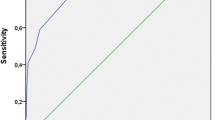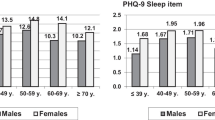Abstract
Purpose
The Pittsburgh Sleep Quality Index (PSQI) is a self-reported questionnaire that measures sleep quality during the previous month. The aims of this study were to analyze the reliability and validity of the Korean version of the PSQI (PSQI-K) and to evaluate its usefulness.
Methods
We developed the PSQI-K, which involved translating the original PSQI into Korean and then translating back into English to check its accuracy. We tested the validity of the PSQI-K on a total of 394 individuals: 261 with poor sleep (primary insomnia, n = 211; narcolepsy, n = 50) and 133 with good sleep. All subjects completed the PSQI-K, 285 had overnight nocturnal polysomnography, and 53 were randomly selected for a retest with the questionnaire after 2–4 weeks without any intervening treatment. The mean PSQI-K global scores in each group were analyzed after adjusting for age and sex.
Results
Cronbach's α coefficient for internal consistency of the total score of the PSQI-K was 0.84 which shows high reliability. Sensitivity and specificity for distinguishing poor and good sleepers were 0.943 and 0.844 using the best cutoff point of 8.5. The total and component scores of the PSQI-K for insomnia and narcolepsy were significantly higher than those for controls (p < 0.05). The test–retest correlation coefficient was 0.65 for the total score (p < 0.001). There was no significant difference between the two values using the paired t tests.
Conclusions
The PSQI-K is a reliable and valid questionnaire for evaluating sleep quality in patients with sleep disorders.


Similar content being viewed by others
References
Carpenter JS, Andrykowski MA (1998) Psychometric evaluation of the Pittsburgh Sleep Quality Index. J Psychosom Res 45(1 Spec No):5–13
Hoch CC, Dew MA, Reynolds CF 3rd, Monk TH, Buysse DJ, Houck PR, Machen MA, Kupfer DJ (1994) A longitudinal study of laboratory- and diary-based sleep measures in healthy “old old” and “young old” volunteers. Sleep 17(6):489–496
Kripke DF, Simons RN, Garfinkel L, Hammond EC (1979) Short and long sleep and sleeping pills. Is increased mortality associated? Arch Gen Psychiatry 36(1):103–116
Sheely LC (1996) Sleep disturbances in hospitalized patients with cancer. Oncol Nurs Forum 23(1):109–111
Mellinger GD, Balter MB, Uhlenhuth EH (1985) Insomnia and its treatment. Prevalence and correlates. Arch Gen Psychiatry 42(3):225–232
Pilcher JJ, Ginter DR, Sadowsky B (1997) Sleep quality versus sleep quantity: relationships between sleep and measures of health, well-being and sleepiness in college students. J Psychosom Res 42(6):583–596
Sateia MJ (2009) Update on sleep and psychiatric disorders. Chest 135(5):1370–1379
Young JS, Bourgeois JA, Hilty DM, Hardin KA (2008) Sleep in hospitalized medical patients, part 1: factors affecting sleep. J Hosp Med 3(6):473–482
Buysse DJ, Reynolds CF 3rd, Monk TH, Berman SR, Kupfer DJ (1989) The Pittsburgh Sleep Quality Index: a new instrument for psychiatric practice and research. Psychiatry Res 28(2):193–213
Aloba OO, Adewuya AO, Ola BA, Mapayi BM (2007) Validity of the Pittsburgh Sleep Quality Index (PSQI) among Nigerian university students. Sleep Med 8(3):266–270
Beck SL, Schwartz AL, Towsley G, Dudley W, Barsevick A (2004) Psychometric evaluation of the Pittsburgh Sleep Quality Index in cancer patients. J Pain Symptom Manage 27(2):140–148
Buysse DJ, Reynolds CF 3rd, Monk TH, Hoch CC, Yeager AL, Kupfer DJ (1991) Quantification of subjective sleep quality in healthy elderly men and women using the Pittsburgh Sleep Quality Index (PSQI). Sleep 14(4):331–338
Farrahi J, Nakhaee N, Sheibani V, Garrusi B, Amirkafi A (2009) Psychometric properties of the Persian version of the Pittsburgh Sleep Quality Index addendum for PTSD (PSQI-A). Sleep Breath 13(3):259–262
Bertolazi AN, Fagondes SC, Hoff LS, Dartora EG, da Silva Miozzo IC, de Barba ME, Barreto SS (2011) Validation of the Brazilian Portuguese version of the Pittsburgh Sleep Quality Index. Sleep Med 12:70–75
Doi Y, Minowa M, Uchiyama M, Okawa M, Kim K, Shibui K, Kamei Y (2000) Psychometric assessment of subjective sleep quality using the Japanese version of the Pittsburgh Sleep Quality Index (PSQI-J) in psychiatric disordered and control subjects. Psychiatry Res 97(2–3):165–172
Shochat T, Tzischinsky O, Oksenberg A, Peled R (2007) Validation of the Pittsburgh Sleep Quality Index Hebrew translation (PSQI-H) in a sleep clinic sample. Isr Med Assoc J 9(12):853–856
Suleiman KH, Yates BC, Berger AM, Pozehl B, Meza J (2010) Translating the Pittsburgh Sleep Quality Index into Arabic. West J Nurs Res 32(2):250–268
Tsai PS, Wang SY, Wang MY, Su CT, Yang TT, Huang CJ, Fang SC (2005) Psychometric evaluation of the Chinese version of the Pittsburgh Sleep Quality Index (CPSQI) in primary insomnia and control subjects. Qual Life Res 14(8):1943–1952
American Psychiatric Association (1994) Diagnostic criteria from DSM-IV. The Association, Washington
American Academy of Sleep Medicine (2005) The international classification of sleep disorders: diagnostic and coding manual, 2nd edn. American Academy of Sleep Medicine, Westchester
Cho YW, Lee JH, Son HK, Lee SH, Shin C, Johns MW (2011) The reliability and validity of the Korean version of the Epworth sleepiness scale. Sleep Breath (in press)
Bastien CH, Vallieres A, Morin CM (2001) Validation of the Insomnia Severity Index as an outcome measure for insomnia research. Sleep Med 2(4):297–307
Backhaus J, Junghanns K, Broocks A, Riemann D, Hohagen F (2002) Test-retest reliability and validity of the Pittsburgh Sleep Quality Index in primary insomnia. J Psychosom Res 53(3):737–740
Cole JC, Motivala SJ, Buysse DJ, Oxman MN, Levin MJ, Irwin MR (2006) Validation of a 3-factor scoring model for the Pittsburgh sleep quality index in older adults. Sleep 29(1):112–116
Acknowledgments
Many thanks to Dr. Daniel J. Buysse, who granted us permission to use his questionnaire and who helped in our study. This work was supported by the brain research-promoting grant from Keimyung University Dongsan Medical Center.
Author information
Authors and Affiliations
Corresponding author
Appendix
Appendix



Rights and permissions
About this article
Cite this article
Sohn, S.I., Kim, D.H., Lee, M.Y. et al. The reliability and validity of the Korean version of the Pittsburgh Sleep Quality Index. Sleep Breath 16, 803–812 (2012). https://doi.org/10.1007/s11325-011-0579-9
Received:
Revised:
Accepted:
Published:
Issue Date:
DOI: https://doi.org/10.1007/s11325-011-0579-9




